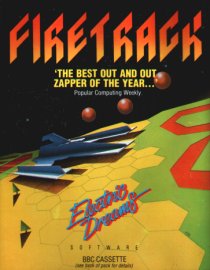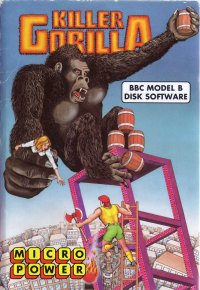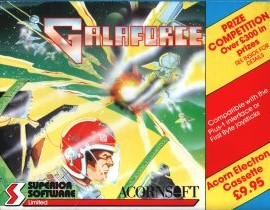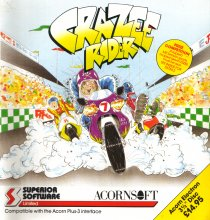Acornsoft was the software arm of Acorn Computers, and a major publisher of software for the BBC Micro and Acorn Electron. As well as games, it also produced a large number of educational titles, extra computer languages and business and utility packages – these included word processor VIEW and the spreadsheet ViewSheet supplied on ROM and cartridge for the BBC Micro/Acorn Electron and included as standard in the BBC Master and Acorn Business Computer.

Superior Software Ltd is a video game publisher. It was one of the main publishers for the BBC Micro and Acorn Electron computers in the 1980s and early 1990s, and occasionally published software to the Commodore 64, Amiga, ZX Spectrum and Amstrad CPC. It currently releases games for Microsoft Windows, iOS and Android, mostly updates of its original games.

Citadel is a computer game developed by Michael Jakobsen for the BBC Micro, and released by Superior Software in 1985. It was also ported to the Acorn Electron. Centred around a castle, this platform game with some puzzle-solving elements requires players to find five hidden crystals and return them to their rightful place. It also features some outside areas external to the castle.
Blue Ribbon was the budget computer software publishing label of CDS Micro Systems.

Acornsoft's Starship Command is a multidirectional shooter released in 1983 for the BBC Micro and Acorn Electron. It was available on cassette as well as 5.25" disc for the BBC and ROM cartridge for the Acorn Electron Plus 1 expansion module. The game was written by Peter Irvin who, along with Jeremy Smith, went on to create the arcade adventure Exile.

Qwak is a 2D puzzle-platform game developed by Jamie Woodhouse. It was initially released for the BBC Micro and Acorn Electron in 1989 as part of Superior/Acornsoft's Play It Again Sam 10 compilation. An updated and enhanced Amiga version was given a budget release by Team17 in 1993. This update added several new features, including a two player mode and additional levels. The game was re-released on the Amiga CD32 later that year in a double-pack with science fiction shooter Alien Breed.

Firetrack is a vertically-scrolling shooter programmed by Nick Pelling and released for the BBC Micro and Commodore 64 platforms in 1987 by Electric Dreams Software. It was also ported to the Acorn Electron by Superior Software in 1989 as part of the Play It Again Sam 7 compilation. It resembles the 1984 arcade game Star Force in style and gameplay. The game was technically advanced and very well received by critics.

Cosmic Camouflage is a multidirectional shooter for the BBC Micro and Acorn Electron. It was released in 1988 as the sequel to Acornsoft's Meteors. Both games are clones of the 1979 Atari, Inc. arcade video game Asteroids.

Stryker's Run is a video game designed by Chris Roberts and Philip Meller for the BBC Micro and BBC Master which was published by Superior Software in 1986. It was also later converted to the Acorn Electron. It is a 2D side-scrolling action game. It was well received, particularly for its graphics.

Pipeline is a video game for the BBC Micro and Acorn Electron, originally published by Superior Software in 1988. It is an overhead view action role-playing game set on a mining platform. It was remade for Microsoft Windows as Pipeline Plus (2004).

Elixir is a video game for the Acorn Electron and BBC Micro released in 1987 by Superior Software. It is a platform game in which the player takes the role of a shrunken scientist.

Killer Gorilla is a Donkey Kong clone written by Adrian Stephens and published by Micro Power for the BBC Micro in 1983. It was ported to the Acorn Electron and Amstrad CPC computers in 1984.

Adventure is a video game published in the UK by Micro Power. It was released on the Acorn Atom in 1982 and on the Acorn Electron and BBC Micro in 1983.

Stock Car is an overhead-view racing video game written by A. W. Halse and published in the UK by Micro Power. It was released in 1984 for the BBC Micro, Acorn Electron, and Commodore 64 computers. Although the cassette inlay gives the release date as 1984, some sources state the release date as 1983, and the game is also known as Stock Car Racer.

Deathstar is multidirectional shooter for the Acorn Electron and BBC Micro developed by Peter Johnson and originally published in the UK by Superior Software in 1985. It is a clone of the arcade game Sinistar.

By Fair Means or Foul is a boxing video game first published for a range of 8-bit home computers in 1988 by Superior Software. It was later reissued with the new title by Codemasters who also published conversions for 16-bit computers. The game offers a variety of boxing moves including fouls. The game received mixed reviews.

Perplexity is a video game created by Ian Collinson for the Acorn Electron and BBC Micro and published by Superior Software in 1990. It is a pseudo 3D maze game with Sokoban-style puzzles.

Galaforce is a fixed shooter video game for the BBC Micro and Acorn Electron, written by Kevin Edwards and published by Superior Software in 1986. It spawned a sequel, Galaforce 2 (1988), and later, Galaforce Worlds (2003).

Crazee Rider is a motorbike racing video game created by Kevin Edwards and published by Superior Software in 1987. It was released for the Acorn Electron and BBC Micro with an enhanced version for the BBC Master. The game was particularly well received for the Electron as it was the first 3D racing game with corners for that machine.

Spycat: An Interactive Exposé of M.I.41⁄2 is an action-adventure game for the BBC Micro and Acorn Electron, written by Peter Scott and published by Superior Software in 1988. The game is a parody of the scandal surrounding the Spycatcher book.



















